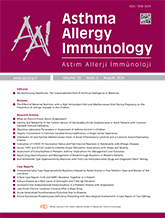


Objective: Common variable immunodeficiency (CVID) can affect the quality of life (QoL), which can be better assessed with validated scales. Our goal was to validate the Turkish version of the Italian CVID-QoL questionnaire.
Materials and Methods: International recommendations for the cultural adaptation and translation process of the original scale were followed. CVID patients completed the Turkish CVID-QoL questionnaire between October 2019 and January 2020. The Short Form Health Survey (SF-36) was used as a comparative questionnaire. Reliability, reproducibility, factor analysis, content validity, convergent validity, and discriminant validity were analyzed.
Results: Fifty CVID patients were included in the study. 64% of the patients (n=32) were male, the mean age of the patients was 36.68 ± 13.2 years, and the median duration of disease was 52.5 months. The instrument had good internal consistency in 50 patients [Cronbach`s alpha: 0.92, emotional functioning (EF): 0.91, relational functioning (RF): 0.77]. Twenty-six patients answered the survey questions again within 14-21 days. Reproducibility was very high; QoL global, intraclass correlation coefficient (ICC)=0.80 (95% CI 0.56-0.91); EF, ICC=0.78 (95% CI 0.51-0.90); RF, ICC=0.82 (95% CI 0.59-0.92); Gastrointestinal and skin symptoms (GSS), ICC=0.89 (95% CI 0.76-0.95); (p<0.001, p<0.001, p<0.001, p<0.001). QoL global, EF and RF scores showed good convergent validity with the similar subscales of SF-36. The number of infections within the last 3 months had a significant impact on QoL global (p=0.038), EF (p=0.045) and RF (p=0.028).
Conclusion: The Turkish version of the CVID QoL scale has appropriate validity and reliability among Turkish patients with CVID.